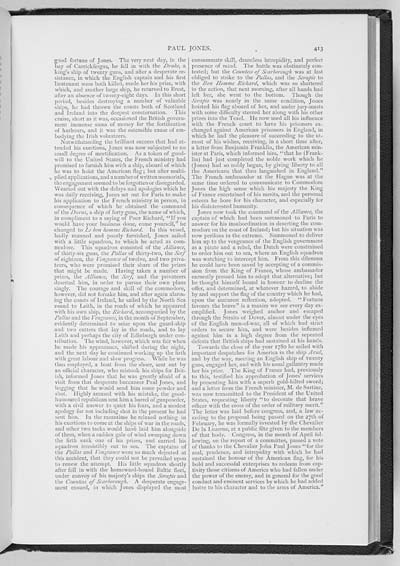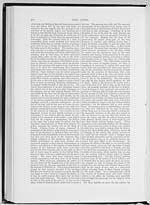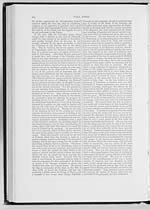PAUL JONES.
413
good fortune of Jones. The very next day, in the
bay of Carrickfergus, he fell in with the Drake, a
king's ship of twenty guns, and after a desperate re-
sistance, in which the English captain and his first
lieutenant were both killed, made her his prize, with
which, and another large ship, he returned to Brest,
after an absence of twenty-eight days. In this short
period, besides destroying a number of valuable
ships, he had thrown the coasts both of Scotland
and Ireland into the deepest consternation. This
cruise, short as it was, occasioned the British govern-
ment immense sums of money for the fortification
of harbours, and it was the ostensible cause of em-
bodying the Irish volunteers.
Notwithstanding the brilliant success that had at-
tended his exertions, Jones was now subjected to no
small degree of mortification. As a token of good-
will to the United States, the French ministry had
promised to furnish him with a ship, aboard of which
he was to hoist the American flag; but after multi-
plied applications, and a number of written memorials,
the engagement seemed to be forgotten or disregarded.
Wearied out with the delays and apologies which he
was daily receiving, Jones set out for Paris to make
his application to the French ministry in person, in
consequence of which he obtained the command
of the Duras, a ship of forty guns, the name of which,
in compliment to a saying of Poor Richard, "If you
would have your business done, come yourself," he
changed to Le bon homme Richard. In this vessel,
badly manned and poorly furnished, Jones sailed
with a little squadron, to which he acted as com-
modore. This squadron consisted of the Alliance,
of thirty-six guns, the Pallas of thirty-two, the Serf
of eighteen, the Vengeance of twelve, and two priva-
teers, who were promised their share of the prizes
that might be made. Having taken a number of
prizes, the Alliance, the Serf, and the privateers
deserted him, in order to pursue their own plans
singly. The courage and skill of the commodore,
however, did not forsake him, and after again alarm-
ing the coasts of Ireland, he sailed by the North Sea
round to Leith, in the roads of which he appeared
with his own ship, the Richard, accompanied by the
Pallas and the Vengeance, in the month of September,
evidently determined to seize upon the guard-ship
and two cutters that lay in the roads, and to lay
Leith and perhaps the city of Edinburgh under con-
tribution. The wind, however, which was fair when
he made his appearance, shifted during the night,
and the next day he continued working up the firth
with great labour and slow progress. While he was
thus employed, a boat from the shore, sent out by
an official character, who mistook his ships for Brit-
ish, informed Jones that he was greatly afraid of a
visit from that desperate buccaneer Paul Jones, and
begging that he would send him some powder and
shot. Highly amused with his mistake, the good-
humoured republican sent him a barrel of gunpowder,
with a civil answer to quiet his fears, and a modest
apology for not including shot in the present he had
sent him. In the meantime he relaxed nothing in
his exertions to come at the ships of war in the roads,
and other two tacks would have laid him alongside
of them, when a sudden gale of wind sweeping down
the firth sunk one of his prizes, and carried his
squadron irresistibly out to sea. The captains of
the Pallas and Vengeance were so much dejected at
this accident, that they could not be prevailed upon
to renew the attempt. His little squadron shortly
after fell in with the homeward-bound Baltic fleet,
under convoy of his majesty's ships the Serapis and
the Countess of Scarborough. A desperate engage-
ment ensued, in which Jones displayed the "most
consummate skill, dauntless intrepidity, and perfect
presence of mind. The battle was obstinately con-
tested; but the Countess of Scarborough was at last
obliged to strike to the Pallas, and the Serapis to
the Bon Homme Richard, which was so shattered
in the action, that next morning, after all hands had
left her, she went to the bottom. Though the
Serapis was nearly in the same condition, Jones
hoisted his flag aboard of her, and under jury-masts
with some difficulty steered her along with his other
prizes into the Texel. He now used all his influence
with the French court to have his prisoners ex-
changed against American prisoners in England, in
which he had the pleasure of succeeding to the ut-
most of his wishes, receiving, in a short time after,
a letter from Benjamin Franklin, the American min-
ister at Paris, which informed him, "that he (Frank-
lin) had just completed the noble work which he
(Jones) had so nobly begun, by giving liberty to all
the Americans that then languished in England."
The French ambassador at the Hague was at the
same time ordered to communicate to Commodore
Jones the high sense which his majesty the King
of France entertained of his merits, and the personal
esteem he bore for his character, and especially for
his disinterested humanity.
Jones now took the command of the Alliance, the
captain of which had been summoned to Paris to
answer for his insubordination in deserting the com-
modore on the coast of Ireland; but his situation was
now perilous in the extreme. Summoned to deliver
him up to the vengeance of the English government
as a pirate and a rebel, the Dutch were constrained
to order him out to sea, where an English squadron
was watching to intercept him. From this dilemma
he could have been saved by accepting of a commis-
sion from the King of France, whose ambassador
earnestly pressed him to adopt that alternative; but
he thought himself bound in honour to decline the
offer, and determined, at whatever hazard, to abide
by and support the flag of the country which he had,
upon the maturest reflection, adopted. "Fortune
favours the brave" is a maxim we see every day ex-
emplified. Jones weighed anchor and escaped
through the Straits of Dover, almost under the eyes
of the English men-of-war, all of which had strict
orders to secure him, and were besides inflamed
against him in a high degree from the repeated
defeats that British ships had sustained at his hands.
Towards the close of the year 1780 he sailed with
important despatches for America in the ship Ariel,
and by the way, meeting an English ship of twenty
guns, engaged her, and with his usual gallantry made
her his prize. The King of France had, previously
to this, testified his approbation of Jones' services
by presenting him with a superb gold-hilted sword;
and a letter from the French minister, M. de Sartine,
was now transmitted to the President of the United
States, requesting liberty "to decorate that brave
officer with the cross of the order of military merit."
The letter was laid before congress, and, a law ac-
ceding to the proposal being passed on the 27th of
February, he was formally invested by the Chevalier
De la Luzerne, at a public fete given to the members
of that body. Congress, in the month of April fol-
lowing, on the report of a committee, passed a vote
of thanks to the Chevalier John Paul Jones "for the
zeal, prudence, and intrepidity with which he had
sustained the honour of the American flag, for his
bold and successful enterprises to redeem from cap-
tivity those citizens of America who had fallen under
the power of the enemy, and in general for the good
conduct and eminent services by which he had added
lustre to his character and to the arms of America."

![]() Universal Viewer |
Universal Viewer | ![]() Mirador |
Large image | Transcription
Mirador |
Large image | Transcription
![]()

